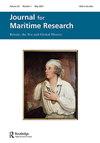纳尔逊海军的其他截肢军官
Q3 Arts and Humanities
引用次数: 0
摘要
在整个革命战争和拿破仑战争期间,皇家海军有一个特殊的问题:它有太多才华横溢、雄心勃勃的军官,他们都在争夺有限的指挥职位。鉴于这一盈余,我们可能会认为,严重的身体损伤会自动取消一名军官的考虑资格。相反,在战斗中失去肢体成为一种荣誉的标志,英雄和他的朋友可以利用它来增加他在海上赢得额外工作的机会。在失去肢体后,至少有26名这样的军官通过继续服役达到了指挥官或更高的军衔。除了讨论其中最著名的海军上将霍雷肖·纳尔逊之外,这篇文章还提供了关于他的几位不太知名的截肢军官的生活和职业的信息。他们的故事将引起18世纪和19世纪社会历史、残疾研究、性别研究、艺术史和海军历史的学者和学生的兴趣。本文章由计算机程序翻译,如有差异,请以英文原文为准。
Other amputee officers in Nelson’s navy
ABSTRACT Throughout the Revolutionary and Napoleonic Wars, the Royal Navy had a peculiar problem: it had too many talented and ambitious officers, all competing for a limited number of command positions. Given this surplus, we might expect that contracting a major physical impairment would automatically disqualify an officer from consideration. Instead, losing a limb in battle became a mark of honor, one that a hero and his friends could use to increase his chances of winning the privilege of additional employment at sea. After the loss of a limb, at least twenty-six such officers reached the rank of Commander or higher through continued service. In addition to discussing the most famous of them all, Admiral Lord Horatio Nelson, this article offers information about the lives and careers of several his lesser-known fellow amputee officers. Their stories will be of interest to scholars and students of 18th and 19th-century social history, disability studies, gender studies, art history, and naval history.
求助全文
通过发布文献求助,成功后即可免费获取论文全文。
去求助
来源期刊

Journal for Maritime Research
Arts and Humanities-History
自引率
0.00%
发文量
0
期刊介绍:
The Journal for Maritime Research ( JMR ), established by the National Maritime Museum in 1999, focuses on historical enquiry at the intersections of maritime, British and global history. It champions a wide spectrum of innovative research on the maritime past. While the Journal has a particular focus on the British experience, it positions this within broad oceanic and international contexts, encouraging comparative perspectives and interdisciplinary approaches. The journal publishes research essays and reviews around 15-20 new books each year across a broad spectrum of maritime history. All research articles published in this journal undergo rigorous peer review, involving initial editor screening and independent assessment, normally by two anonymous referees.
 求助内容:
求助内容: 应助结果提醒方式:
应助结果提醒方式:


